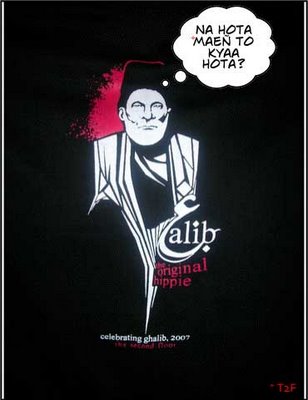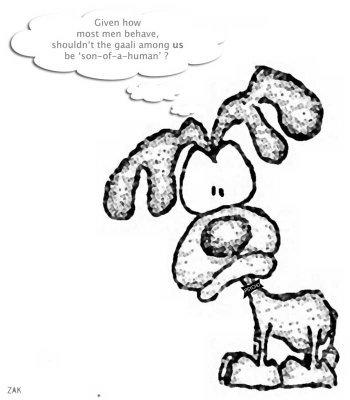Thursday, January 29, 2009
Sunday, January 18, 2009
Na hota T2F to ...
Labels: Bloggers, Events, Literature, Media, News, Pakistan, People, Politics, Rant, Science, T2F, Technology, Urdu
Saturday, January 17, 2009
Thank you, T2F supporters ...
You have been marvelous in your messages of love and affection and support. It's overwhelming to hear people talk about what T2F has, in less than 2 years, come to mean to so many.
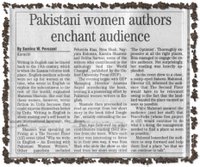
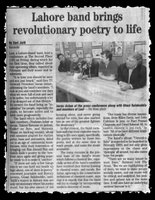
Hitting the ground running ...
Please pass on the url of this post to your friends - Zak
A direct message from Sabeen Mahmud 17th January 2009 Dear PeaceNiche and T2F Community, 612 days ago T2F opened its doors to you. Our vision was lofty, and frankly, a bit mad. Who would walk up to the second floor of an office building on Khayaban-e-Ittehad to listen to a poet rambling on about revolution, or a scientist arguing in favour of evolution, or some kids playing drums? Well, as it turns out, thousands of people ... In these 612 days minus Mondays, our tiny space has hosted over 150 events featuring thought leaders, artists, poets, musicians, scientists, magicians, writers, philosophers, dancers, actors, lawyers, and activists. Hundreds of you have written in to tell us how much T2F means to you and to the city of Karachi. Every e-mail, snail mail, text message, and Facebook Wall post that you have sent has given us the strength to carry on. Many of you have supported us through your donations and even helped us replace our stolen Mac. We can't thank you enough. By now you are probably thinking that we're closing down and that this is a goodbye note. No such luck :D But there is some critical news that we need to share with you. We called our landlord the day-before-yesterday, to ask him when he was going to get the lift fixed. He was non-committal and then said he wanted us to vacate the premises. The initial shock was soon replaced by calm determination and optimism. At yesterday's literary event, we broke the news. Practically everyone came forward to express solidarity and support. Some of you graciously volunteered your offices, houses, gardens, and basements for us to conduct our events till we find our own space. And one of you, a volunteer/student/journalist, kick-started the donation drive with a contribution of Rs. 5,000. Thank you Batool. So, here's the plan: We plan to vacate the current premises by early February 2009. We have already been offered several temporary spaces to conduct our events until such time that we find a permanent venue. We would like to move to a new space - a home we can call our own - as soon as possible. It's going to be tough and we can't do it alone. We simply don't have the funds. As you know, PeaceNiche is a non-profit organization and we have meagre funding. We are reaching out to you to help us in any way that you can. We will be writing to you again with specific requirements, but in the meanwhile, please spread the word about our need for a permanent, rent-free space so that we can get up and running without losing momentum. Over the next few days, please come to T2F as often as possible - we'll recreate the magic wherever we go but this is where it all started. Thank you Karachi for believing in us. Peace/Sabeen __________________________________________ Sabeen Mahmud Director=========================PeaceNiche / The Second Floor Phone: (92-300) 823-0276 http://www.peaceniche.org | http://www.t2f.biz About Us The Second Floor (T2F) is a project of PeaceNiche, a not-for-profit NGO committed to becoming a vibrant centre of Pakistan’s developing civil society. T2F is a community platform for open dialogue and features a coffeehouse, bookshop, and exhibition gallery.
Labels: Activism, Art, Bloggers, Books, Events, Literature, Media, Music, Pakistan, People, Personal, Poetry, Politics, Rant, Science, T2F, Urdu
Thursday, January 15, 2009
A Non-Violent Look at Conflict & Violence
It is of utmost importance to remember the time of this writing. It is 1938, Hitler is ruling Germany, and the clouds of a terrible conflict have begun to form. Gandhi's article shows his incredible sense of right and wrong, his blind faith in his methodology, and his profound vision of things to come. - Ed.
On Jews & Middle-East
by Mohandas K. Gandhi Several letters have been received by me asking me to declare my views about the Arab-Jew question in Palestine and the persecution of the Jews in Germany . It is not without hesitation that I venture to offer my views on this very difficult question. My sympathies are all with the Jews. I have known them intimately in South Africa . Some of them became life-long companions. Through these friends I came to learn much of their age-long persecution. They have been the untouchables of Christianity. The parallel between their treatment by Christians and the treatment of untouchables by Hindus is very close. Religious sanction has been invoked in both cases for the justification of the inhuman treatment meted out to them. Apart from the friendships, therefore, there is the more common universal reason for my sympathy for the Jews. But my sympathy does not blind me to the requirements of justice. The cry for the national home for the Jews does not make much appeal to me. The sanction for it is sought in the Bible and the tenacity with which the Jews have hankered after return to Palestine . Why should they not, like other peoples of the earth, make that country their home where they are born and where they earn their livelihood? Palestine belongs to the Arabs in the same sense that England belongs to the English or France to the French. It is wrong and inhuman to impose the Jews on the Arabs. What is going on in Palestine today cannot be justified by any moral code of conduct. The mandates have no sanction but that of the last war. Surely it would be a crime against humanity to reduce the proud Arabs so that Palestine can be restored to the Jews partly or wholly as their national home. The nobler course would be to insist on a just treatment of the Jews wherever they are born and bred. The Jews born in France are French in precisely the same sense that Christians born in France are French. If the Jews have no home but Palestine, will they relish the idea of being forced to leave the other parts of the world in which they are settled? Or do they want a double home where they can remain at will? This cry for the national home affords a colorable justification for the German expulsion of the Jews. But the German persecution of the Jews seems to have no parallel in history. The tyrants of old never went so mad as Hitler seems to have gone. And he is doing it with religious zeal. For he is propounding a new religion of exclusive and militant nationalism in the name of which many inhumanity becomes an act of humanity to be rewarded here and hereafter. The crime of an obviously mad but intrepid youth is being visited upon his whole race with unbelievable ferocity. If there ever could be a justifiable war in the name of and for humanity, a war against Germany, to prevent the wanton persecution of a whole race, would be completely justified. But I do not believe in any war. A discussion of the pros and cons of such a war is therefore outside my horizon or province. But if there can be no war against Germany , even for such a crime as is being committed against the Jews, surely there can be no alliance with Germany. How can there be alliance between a nation which claims to stand for justice and democracy and one which is the declared enemy of both? Or is England drifting towards armed dictatorship and all it means? Germany is showing to the world how efficiently violence can be worked when it is not hampered by any hypocrisy or weakness masquerading as humanitarianism. It is also showing how hideous, terrible and terrifying it looks in its nakedness. Can the Jews resist this organized and shameless persecution? Is there a way to preserve their self-respect, and not to feel helpless, neglected and forlorn? I submit there is. No person who has faith in a living God need feel helpless or forlorn. Jehovah of the Jews is a God more personal than the God of the Christians, the Musalmans or the Hindus, though, as a matter of fact in essence, He is common to all the one without a second and beyond description. But as the Jews attribute personality to God and believe that He rules every action of theirs, they ought not to feel helpless. If I were a Jew and were born in Germany and earned my livelihood there, I would claim Germany as my home even as the tallest gentile German may, and challenge him to shoot me or cast me in the dungeon; I would refuse to be expelled or to submit to discriminating treatment. And for doing this, I should not wait for the fellow Jews to join me in civil resistance but would have confidence that in the end the rest are bound to follow my example. If one Jew or all the Jews were to accept the prescription here offered, he or they cannot be worse off than now. And suffering voluntarily undergone will bring them an inner strength and joy which no number of resolutions of sympathy passed in the world outside Germany can. Indeed, even if Britain , France and America were to declare hostilities against Germany, they can bring no inner joy, no inner strength. The calculated violence of Hitler may even result in a general massacre of the Jews by way of his first answer to the declaration of such hostilities. But if the Jewish mind could be prepared for voluntary suffering, even the massacre I have imagined could be turned into a day of thanksgiving and joy that Jehovah had wrought deliverance of the race even at the hands of the tyrant. For to the god fearing, death has no terror. It is a joyful sleep to be followed by a waking that would be all the more refreshing for the long sleep.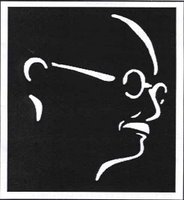 It is hardly necessary for me to point out that it is easier for the Jews than for the Czechs to follow my prescription. And they have in the Indian satyagraha campaign in South Africa an exact parallel. There the Indians occupied precisely the same place that the Jews occupy in Germany . The persecution had also a religious tinge. President Kruger used to say that the white Christians were the chosen of God and Indians were inferior beings created to serve the whites. A fundamental clause in the Transvaal constitution was that there should be no equality between the whites and colored races including Asiatics. There too the Indians were consigned to ghettos described as locations. The other disabilities were almost of the same type as those of the Jews in Germany. The Indians, a mere handful, resorted to satyagraha without any backing from the world outside or the Indian Government. Indeed the British officials tried to dissuade the satyagrahis (soldiers of non-violence) from their contemplated step. World opinion and the Indian Government came to their aid after eight years of fighting. And that too was by way of diplomatic pressure, not of a threat of war.
But the Jews of Germany can offer satyagraha under infinitely better auspices than Indians of South Africa. The Jews are a compact, homogeneous community in Germany. They are far more gifted than the Indians of South Africa. And they have organized world opinion behind them. I am convinced that if someone with courage and vision can arise among them to lead them in nonviolent action, the winter of their despair can in the twinkling of an eye be turned into the summer of hope. And what has today become a degrading man-hunt can be turned in to a calm and determined stand offered by unarmed men and women possessing the strength of suffering given to them by Jehovah. It will be then a truly religious resistance offered against the godless fury of dehumanized man. The German Jews will score a lasting victory over the German gentiles in the sense that they will have converted that latter to an appreciation of human dignity. They will have rendered service to fellow-Germans and proved their title to be the real Germans as against those who are today dragging, however unknowingly, the German name into the mire.
And now a word to the Jews in Palestine. I have no doubt that they are going about it the wrong way. The Palestine of the Biblical conception is not geographical tract. It is in their hearts. But if they must look to the Palestine of geography as their national home, it is wrong to enter it under the shadow of the British gun. A religious act cannot be performed with the aid of the bayonet or the bomb. They can settle in Palestine only by the goodwill of the Arabs. They should seek to convert the Arab heart. The same God rules the Arab heart, who rules the Jewish heart. They can offer satyagraha in front of the Arabs and offer themselves to be shot or thrown in to the Dead Sea without raising a little finger against them. They will find the world opinion in the their favor in their religious aspiration. There are hundreds of ways of reasoning with the Arabs, if they will only discard the help of the British bayonet. As it is, they are co-sharers with the British in despoiling a people who have done no wrong to them.
I am not defending the Arab excesses. I wish they had chosen the way of non-violence in resisting what they rightly regarded as an unwarrantable encroachment upon their country. But according to the accepted canons of right and wrong, nothing can be said against the Arab resistance in the face of overwhelming odds.
Let the Jews who claim to be the chosen race prove their title by choosing the way of non-violence for vindicating their position on earth. Every country is their home including Palestine, not by aggression but by loving service. A Jewish friend has sent me a book called The Jewish Contribution to Civilization by Cecil Roth. It gives a record of what the Jews have done to enrich the word's Literature, Art, Music, Drama, Science, Medicine, Agriculture, etc. --- Given the will, the Jew can refuse to be treated as the outcaste of the West, to be despised or patronized. He can command the attention and respect of the world by being man, the chosen creation of God, instead of being man who is fast sinking to the brute and forsaken by God. They can add to their many contributions the surpassing contribution of non-violent action.
It is hardly necessary for me to point out that it is easier for the Jews than for the Czechs to follow my prescription. And they have in the Indian satyagraha campaign in South Africa an exact parallel. There the Indians occupied precisely the same place that the Jews occupy in Germany . The persecution had also a religious tinge. President Kruger used to say that the white Christians were the chosen of God and Indians were inferior beings created to serve the whites. A fundamental clause in the Transvaal constitution was that there should be no equality between the whites and colored races including Asiatics. There too the Indians were consigned to ghettos described as locations. The other disabilities were almost of the same type as those of the Jews in Germany. The Indians, a mere handful, resorted to satyagraha without any backing from the world outside or the Indian Government. Indeed the British officials tried to dissuade the satyagrahis (soldiers of non-violence) from their contemplated step. World opinion and the Indian Government came to their aid after eight years of fighting. And that too was by way of diplomatic pressure, not of a threat of war.
But the Jews of Germany can offer satyagraha under infinitely better auspices than Indians of South Africa. The Jews are a compact, homogeneous community in Germany. They are far more gifted than the Indians of South Africa. And they have organized world opinion behind them. I am convinced that if someone with courage and vision can arise among them to lead them in nonviolent action, the winter of their despair can in the twinkling of an eye be turned into the summer of hope. And what has today become a degrading man-hunt can be turned in to a calm and determined stand offered by unarmed men and women possessing the strength of suffering given to them by Jehovah. It will be then a truly religious resistance offered against the godless fury of dehumanized man. The German Jews will score a lasting victory over the German gentiles in the sense that they will have converted that latter to an appreciation of human dignity. They will have rendered service to fellow-Germans and proved their title to be the real Germans as against those who are today dragging, however unknowingly, the German name into the mire.
And now a word to the Jews in Palestine. I have no doubt that they are going about it the wrong way. The Palestine of the Biblical conception is not geographical tract. It is in their hearts. But if they must look to the Palestine of geography as their national home, it is wrong to enter it under the shadow of the British gun. A religious act cannot be performed with the aid of the bayonet or the bomb. They can settle in Palestine only by the goodwill of the Arabs. They should seek to convert the Arab heart. The same God rules the Arab heart, who rules the Jewish heart. They can offer satyagraha in front of the Arabs and offer themselves to be shot or thrown in to the Dead Sea without raising a little finger against them. They will find the world opinion in the their favor in their religious aspiration. There are hundreds of ways of reasoning with the Arabs, if they will only discard the help of the British bayonet. As it is, they are co-sharers with the British in despoiling a people who have done no wrong to them.
I am not defending the Arab excesses. I wish they had chosen the way of non-violence in resisting what they rightly regarded as an unwarrantable encroachment upon their country. But according to the accepted canons of right and wrong, nothing can be said against the Arab resistance in the face of overwhelming odds.
Let the Jews who claim to be the chosen race prove their title by choosing the way of non-violence for vindicating their position on earth. Every country is their home including Palestine, not by aggression but by loving service. A Jewish friend has sent me a book called The Jewish Contribution to Civilization by Cecil Roth. It gives a record of what the Jews have done to enrich the word's Literature, Art, Music, Drama, Science, Medicine, Agriculture, etc. --- Given the will, the Jew can refuse to be treated as the outcaste of the West, to be despised or patronized. He can command the attention and respect of the world by being man, the chosen creation of God, instead of being man who is fast sinking to the brute and forsaken by God. They can add to their many contributions the surpassing contribution of non-violent action.
(Article Written on November 20, 1938 - Published in Harijan on November 26, 1938)
© 1987 Navajivan Trust.Labels: Activism, Events, Literature, News, People, Politics, Religion
Thank you, Naomi Klein & Guardian
Enough. It's time for a boycott Naomi Klein Saturday January 10 2009 The Guardian It's time. Long past time. The best strategy to end the increasingly bloody occupation is for Israel to become the target of the kind of global movement that put an end to apartheid in South Africa. In July 2005 a huge coalition of Palestinian groups laid out plans to do just that. They called on "people of conscience all over the world to impose broad boycotts and implement divestment initiatives against Israel similar to those applied to South Africa in the apartheid era". The campaign Boycott, Divestment and Sanctions was born. Every day that Israel pounds Gaza brings more converts to the BDS cause - even among Israeli Jews. In the midst of the assault roughly 500 Israelis, dozens of them well-known artists and scholars, sent a letter to foreign ambassadors in Israel. It calls for "the adoption of immediate restrictive measures and sanctions" and draws a clear parallel with the anti-apartheid struggle. "The boycott on South Africa was effective, but Israel is handled with kid gloves ... This international backing must stop." Yet even in the face of these clear calls, many of us still can't go there. The reasons are complex, emotional and understandable. But they simply aren't good enough. Economic sanctions are the most effective tool in the non-violent arsenal: surrendering them verges on active complicity. Here are the top four objections to the BDS strategy, followed by counter-arguments. Punitive measures will alienate rather than persuade Israelis. The world has tried what used to be called "constructive engagement". It has failed utterly. Since 2006 Israel has been steadily escalating its criminality: expanding settlements, launching an outrageous war against Lebanon, and imposing collective punishment on Gaza through the brutal blockade. Despite this escalation, Israel has not faced punitive measures - quite the opposite. The weapons and $3bn in annual aid the US sends Israel are only the beginning. Throughout this key period, Israel has enjoyed a dramatic improvement in its diplomatic, cultural and trade relations with a variety of other allies. For instance, in 2007 Israel became the first country outside Latin America to sign a free-trade deal with the Mercosur bloc. In the first nine months of 2008, Israeli exports to Canada went up 45%. A new deal with the EU is set to double Israel's exports of processed food. And in December European ministers "upgraded" the EU-Israel association agreement, a reward long sought by Jerusalem. It is in this context that Israeli leaders started their latest war: confident they would face no meaningful costs. It is remarkable that over seven days of wartime trading, the Tel Aviv Stock Exchange's flagship index actually went up 10.7%. When carrots don't work, sticks are needed. Israel is not South Africa. Of course it isn't. The relevance of the South African model is that it proves BDS tactics can be effective when weaker measures (protests, petitions, backroom lobbying) fail. And there are deeply distressing echoes of apartheid in the occupied territories: the colour-coded IDs and travel permits, the bulldozed homes and forced displacement, the settler-only roads. Ronnie Kasrils, a prominent South African politician, said the architecture of segregation he saw in the West Bank and Gaza was "infinitely worse than apartheid". That was in 2007, before Israel began its full-scale war against the open-air prison that is Gaza. Why single out Israel when the US, Britain and other western countries do the same things in Iraq and Afghanistan? Boycott is not a dogma; it is a tactic. The reason the strategy should be tried is practical: in a country so small and trade-dependent, it could actually work. Boycotts sever communication; we need more dialogue, not less. This one I'll answer with a personal story. For eight years, my books have been published in Israel by a commercial house called Babel. But when I published The Shock Doctrine, I wanted to respect the boycott. On the advice of BDS activists, including the wonderful writer John Berger, I contacted a small publisher called Andalus. Andalus is an activist press, deeply involved in the anti-occupation movement and the only Israeli publisher devoted exclusively to translating Arabic writing into Hebrew. We drafted a contract that guarantees that all proceeds go to Andalus's work, and none to me. I am boycotting the Israeli economy but not Israelis. Our modest publishing plan required dozens of phone calls, emails and instant messages, stretching between Tel Aviv, Ramallah, Paris, Toronto and Gaza City. My point is this: as soon as you start a boycott strategy, dialogue grows dramatically. The argument that boycotts will cut us off from one another is particularly specious given the array of cheap information technologies at our fingertips. We are drowning in ways to rant at each other across national boundaries. No boycott can stop us. Just about now, many a proud Zionist is gearing up for major point-scoring: don't I know that many of these very hi-tech toys come from Israeli research parks, world leaders in infotech? True enough, but not all of them. Several days into Israel's Gaza assault, Richard Ramsey, managing director of a British telecom specialising in voice-over-internet services, sent an email to the Israeli tech firm MobileMax: "As a result of the Israeli government action in the last few days we will no longer be in a position to consider doing business with yourself or any other Israeli company." Ramsey says his decision wasn't political; he just didn't want to lose customers. "We can't afford to lose any of our clients," he explains, "so it was purely commercially defensive." It was this kind of cold business calculation that led many companies to pull out of South Africa two decades ago. And it's precisely the kind of calculation that is our most realistic hope of bringing justice, so long denied, to Palestine. A version of this column was published in the Nation Copyright Guardian Newspapers Limited 2009
